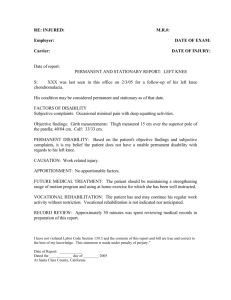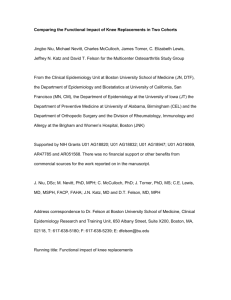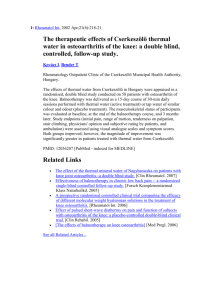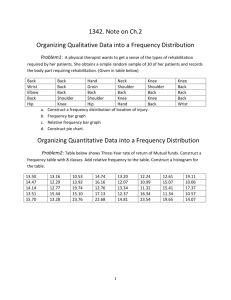Effects of Balance Interventions on Elderly Patients
advertisement
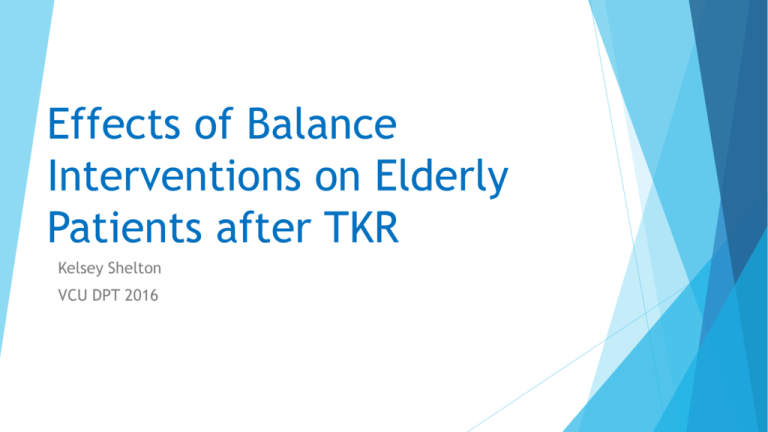
Effects of Balance Interventions on Elderly Patients after TKR Kelsey Shelton VCU DPT 2016 Overview 1. Present patient case from Clinical Education II 2. Ask a clinical question 3. Analyze available research 4. Answer the clinical question and relate to patient case Patient History • 76 y/o African American female • Occupation: Retired • PLOF: Community level with single point cane • Independent in private residence • Home Environment: One story house with 3 stairs to enter, bilateral rails • Admitted to area hospital 5/19 for a L total knee replacement and admitted to skilled nursing facility 5/23 Diagnosis – Total Knee Replacement • Procedure • Risks/Complications • • Infection, blood clots, heart attack, stroke, nerve damage Recovery • Average hospital stay – 3-5 days • Physical therapy to restore function, strength, and ROM • 1-2 months Patient History • Current Medical Hx: • • DM II, HTN, orthopnea, GERD, bilateral peripheral neuropathy in toes, atrial fibrillation PMHx • R shoulder rotator cuff repair 2014, R TKR 2004 Patient Examination/Evaluation Objective Findings: • • • Pt was A&O x4, alert, cooperative Safety awareness – Good (safe for home alone, no cues for safety) AROM - LLE – knee flexion impaired (76°), knee extension impaired (+10°) • Strength – RLE – 4/5, LLE – 3/5 • Sitting Balance – Good • Standing Balance – Fair • Bed mobility – Mod I • Functional transfers – Mod I • Gait - 150 ft with one rest break • Stairs – NT Assessment Gait SOB and complained of increased pain with ambulation (8-9/10 VAS scale) Pt negotiated obstacles with CGA Functional Limitation – mobility: walking and moving around Participation Return to home independent Preform Attend Restrictions community level functional activity Sunday sermon Treatment Goals Pt goal STG - Patient will increase: Standing balance to good in order to prepare for gait activities AROM of L knee flexion to 95° to facilitate patient’s ability to perform ascending/descending 3 stairs with bilateral rails in order to safely return to private residence L knee extension strength to 4+/5 in order to improve limb stability during gait LTG: Pt will negotiate obstacles while ambulating with Mod I for safety while turning in order to return to prior living and supervision levels Interventions LE strengthening in all positions Balance Gait activities training Manual Pt education Prognosis and Outcomes Prognosis Good potential to progress towards goals due to prior PT with R TKR and high prior level of function, good family support, and intact cognition Outcomes Pt met all goals and was able to ambulate short distances with SPC with supervision Pt discharged (20 visits) home alone with family support and enrolled in outpatient orthopedic physical therapy Clinical Question Does improving balance in a 70 year old female patient with knee osteoarthritis after a total knee replacement improve overall functional mobility as assessed through improved performance on reliable and valid functional outcome measures? Effects of balance training on functional outcome after total knee replacement in patients with knee osteoarthritis: a randomized controlled trial Liao et al. Clinical Rehabilitation, 2013 Objective: To evaluate the effectiveness of additional balance training on mobility and outcome in patients with knee osteoarthritis after a TKR A prospective intervention study, randomized control trial 113 Participants – 50-85 y/o with tricompartmental, cemented TKR Experimental group – functional training and additional balance training vs. control Liao et al. Exclusion Criteria Uncontrolled hypertension Diabetes BMI > 40 kg/m2 Other lower extremity orthopedic problems that limited the patient’s function Neurological impairment Functional Measures Distance of functional forward reach Single leg stance (eyes closed and open) Sit-to-stand Stair test climbing test Timed 10m walk TUG WOMAC Index Osteoarthritis Liao et al. Interventions 3x per week, one on one with PT Training Routine (60 min) Warm-up Stretch Mobility Muscle exercises strengthening Functional task oriented exercises Balance (90 min) Side stepping, braiding, tandem walk, change direction, airex, BAPS, balance beam Liao et al. Results: Experimental group scores were significantly better than those of the control group for all of the outcome measures (p<0.001) Conclusion: For patients with knee OA receiving a TKR, eight weeks of additional balance training can improve functional performance in mobility after surgery An additional balance training program is recommended for the rehabilitation plan Liao et al. Limitations: Knee OA Lacked non-intervention control group – result of natural return of muscle/physical function Dose effect asymmetry Time lapse Liao et al. Importance for my patient: Age Gender Knee OA, TKR Diabetes Functional outcomes of outpatient balance training following total knee replacement in patients with knee osteoarthritis: a randomized controlled trial Liao et al. Clinical Rehabilitation, 2015 Objective: To evaluate whether balance training after total knee replacement surgery improves functional outcomes and to determine whether postoperative balance is associated with mobility A prospective intervention study and randomized controlled trial Follow-up of earlier study – evaluate long term benefits 108 participants (only 5 did not return) Functional Measures Liao et al. Results: The balance rehabilitation group exhibited greater improvement in balance, mobility, and functional outcomes in the 32-week follow-up assessment than the control group who received general functional training Conclusion The administration of postoperative outpatient balance training not only improves balance and mobility outcomes immediately after intervention, but also benefits six months after intervention Liao et al. Limitations Same authors and population Specific Lack surgeon of definition Importance to my patient Effect on long term therapy Incorporation into POC Does improving balance in a 70 year old female patient with knee osteoarthritis after a total knee replacement improve overall functional mobility as assessed through improved performance on reliable and valid functional outcome measures? Yes! Effects of Balance Interventions on Elderly Patients after TKR Questions? References Liao, C., Lin, L., Huang, Y., Huang, S., Chou, L., & Liou, T. (2015). Functional outcomes of outpatient balance training following total knee replacement in patients with knee osteoarthritis: a randomized controlled trial. Clinical Rehabilitation, 29(9), 855-867. Liao, C., Liou, T., Huang, Y., & Huang, Y. (2013). Effects of balance training on functional outcome after total knee replacement in patients with knee osteoarthritis: a randomized controlled trial. Clinical Rehabilitation, 27(8), 697-709.

